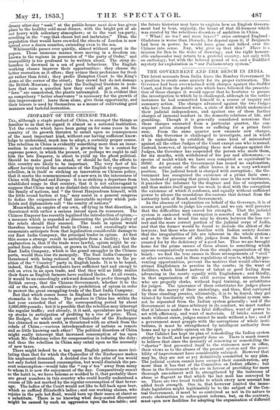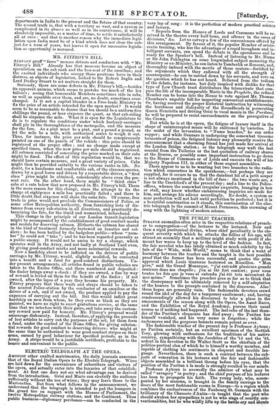THE GOVERNMENT AND THE BENCH IN INDIA. THE latest accounts
from India leave the Bombay Government in a position to create some anxiety for its proper extrication. The Governor had been overwhelmed with charges against the Sadder Court, and from the public acts which have followed the presenta- tion of those charges it would appear that he hesitates to pursue the investigation to which he is challenged, although in the earlier instances he had committed himself to a course of inquiry and summary action. The charges advanced against the two Judges who hav2. been dismissed were, a state of debt which undermined their judicial independence, and against one of them further charges of immoral conduct in the domestic relations of life, and gambling. Though it is generally considered notorious that these charges emanated from a particular quarter, the con- sequent action stamped them as sufficing for a prima faoie ease. From the same quarter now emanate new charges, which the Governor is challenged to investigate, and in which it is undertaken to establish the same kind of misconduct against all the other Judges of the Court except one who is named. Instead, however, of investigating these new charges against the Judges, the Governor has suspended the person who made them, for six months, with withdrawal of his pay and allowances,—a species of mulct which we have seen computed as equivalentlo 2000/. At present the Government has issued no explanation, and the actual state of the affair leaves it in a very awkward position. The judicial bench is charged with corruption ; the Go- vernment has recognized the existence of a prima facie case ; but, instead of pursuing that prima facie case in the new instances, it punishes the informer by the diagram and fine of suspension, and thus makes itself appear too weak to deal with the corruption the existence of which it confesses, and equally without sufficient power to silence the scandalous discussions that detract from the authority both of Bench and Government. In the absence of explanation on behalf of the Governor, it is of course not possible to judge his conduct, and we can well perceive that the difficulties may exceed his strength. That the judicial system is °tinkered with corruption is asserted on all sides. It is probable that a broad line may be drawn between the less cor- rect and the more correct portion of the judicial corps of India, and that the former would be found to include the ablest of the lawyers; but those who are familiar with Indian society declare that the irregularities of life are inherent in the whole system ; and as to the absence of able judges from the bench, it is ac- counted for by the deficiency of a good bar. Thus we are brought home for the prime causes of these abuses to something which appears comparatively remote from the simple organization of the bench : we find the true causes in those arrangements of "civil" or other services, and in those regulations of cow ts, which, by pre- venting opportunities, prevent the motives that would otherwise attract Englishmen to practise in the courts; in the want of facilities, which hinder natives of talent or good feeling from iidvancing in the courts equally with Englishmen ; and thirdly, in that organization of the civil service which misuses those who are properly clerks, without legal training, as substitutes for judges. The ignorance of these substitutes for judges places them at the mercy of their underlings, and thus, first corrupted by those standing proxies, ultimately, it is to be feared, they get tainted by familiarity with the abuse. The judicial system can- not be separated from the Indian system generally ; and if the Government is at times arbitrary in its conduct, we must confess that it labours under the two fatal difficulties, want of power to act with efficiency, and want of materials. If bricks cannot be made without straw, judges cannot be made without a bar ; and if a government must grapple with the corruptions of whole insti- tutions,- it must be strengthened by intelligent authority from home and by a public opinion on the spot.
Our Cabinet has kept its plan of remodelling the Indian system strictly to itself, and has properly done so. There is much, eason to believe that smoe the necessity of renewing or remodelling the "charter" first presented itself to the statesmen now in office, their views as to the abuses of the present system and the possi- bility of improvement have considerably enlarged. However that may be, they are not as yet definitively committed to any plan. The judicial system cannot have escaped their consideration, any more than it has that of the Committee on Indian affairs, but
those in the Government who are in favour of providing for more thorough amendment will be strengthened by the instances of
abuse so flagrant as that which the last mail has conveyed to us. There are two broad truths to which every new account has added fresh strength. One is, that however limited the imme-
diate legislation might legitimately be to the subject of the Cen- tral Government, it must be so contrived as not in its nature to create obstructions to subsequent reforms, but, on the contrary, must open new facilities for adapting the organization of different
departments in India to the present and the future of that country. The second truth is, that with a territory so vast, and a system so complicated in its abuses as well as in its contrivance, it will be absolutely impossible, as a matter of time, to settle it satisfactorily all at once : and that is another reason why the immediate legis- lation upon India must be of a kind which does not close the sub-- ject for a term of years, but leaves it open for successive legisla- tion as opportunity is matured.



























 Previous page
Previous page